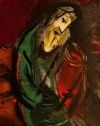|
Note: In the morning service, the Torah portion of Deuteronomy 4:25-40 is read (Moses' prophecy regarding Israel's future iniquity and exile) followed by the Haftarah of Jeremiah 8:13-9:24 which describes the desolation of Zion.
Blessing before Reading Lamentations:
ūæų╝ųĖū©ūĢų╝ūÜų░ ūÉųĘū¬ų╝ųĖūö ūÖūöūĢūö ūÉų▒ū£ūöųĄūĀūĢų╝ ū×ųČū£ųČūÜų░ ūöųĖūóūĢų╣ū£ųĖūØ
ūÉų▓ū®ūüųČū© ūóųĖū®ūéųĖūĀūĢų╝ ūÉų▓ūĪų┤ūÖū©ųĄūÖ ū¬ų╝ų┤ū¦ų░ūĢųĖūö
ba┬Ęrookh ┬Ę at┬Ętah ┬Ę Adonai ┬Ę E┬Ęlo┬Ęhei'┬Ęnoo ┬Ę me'┬Ęlekh ┬Ę ha┬Ęo┬Ęlam,
a┬Ęsher ┬Ę a┬Ęsa'┬Ęnoo ┬Ę a┬Ęsee┬Ęrei ┬Ę teek┬Ęvah

"Blessed art You, LORD our God, King of the universe,
who has made us captives of hope."
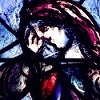
Download Study Card
The Haftarah for Tishah B'Av
As mentioned above, the Haftarah (prophetic reading) for Tishah B'Av comes from the prophet/priest Jeremiah (ūÖų┤ū©ų░ū×ų░ūÖųĖūöūĢų╝), who was an eyewitness to the destruction of the First Temple and the subsequent exile of the Jewish people. Here is a little bit of background.
The Northern Kingdom had already been judged and sent into exile (c. 722 BC) and the Kingdom of Judah was following the same self-destructive path. Sometime after King Josiah established Torah reform in the land (c. 626 BC), the LORD commissioned the Jeremiah to confront the people of Judah for their ongoing apostasy and idolatry. He was just a child at the time (Jer. 1:6-9). Jeremiah's long ministry (over 40 years) would subsequently span the reigns of five different kings of Judah: Josiah (ūÖūÉū®ūüų┤ūÖų╝ųĖūöūĢų╝), Jehoahaz (ūÖų░ūöūĢų╣ūÉųĖūŚųĖū¢), Jehoiakim (ūÖų░ūöūĢų╣ūÖųĖū¦ų┤ūÖūØ), Jehoiachin (ūÖų░ūöūĢų╣ūÖųĖūøų┤ūÖū¤), and Zedekiah (ū”ų┤ūōų░ū¦ų┤ūÖų╝ųĖūö). During these years Jeremiah was routinely ignored, slandered as a false prophet, and abused. He was physically attacked, thrown into a well, put into stocks, imprisoned by king Zedekiah, threatened with death, and finally abducted into exile to Egypt by Jewish zealots who ignored his warnings not to rebel against the Babylonians (see the Fast of Gedaliah).
In the Haftarah for Tishah B'Av, we read how Jeremiah inwardly struggled while trying to reach the Jewish people. The LORD likened the Jews living in Judah to a withered fig tree that born no figs. "What I gave them has passed away from them" (Jer. 8:13; cp. Matt. 21:19). The people were in despair and complained that God has given them the "water of gall" (ū×ųĄūÖųŠū©ūÉū®ūü) to drink because of their sins (Jer. 8:14). This water may be an image of crying (i.e., mei rosh literally means "tears from the head") or it may allude to the water given the sotah (i.e., the suspected adulteress) as explained in Numbers 5:12-31. If such a woman was indeed guilty of adultery, she would die a painful death: her body would swell, her face would become ashen, and her limbs would weaken. "We looked for peace, but no good came; for a time of healing, but behold, terror" (Jer. 8:15). God then stated that He would send the Babylonians from the north to devour the land and send serpents to bite the people (Jer. 8:16-17).
Jeremiah expressed grief over the destruction of his people and his heart was sick within him (Jer. 8:18). In his visions he heard the cry of the people asking for God's help from Zion, and he wondered how God would answer, but the LORD was angry because of Judah's ongoing idolatry and vanities (Jer. 8:19). Some time passed, but there was still no response from heaven: avar katzir kalah kayitz, v'anachnu lo noshanu (ūóųĖūæųĘū© ū¦ųĖū”ų┤ūÖū© ūøų╝ųĖū£ųĖūö ū¦ųĖūÖų┤ūź ūĢųĘūÉų▓ūĀųĘūŚų░ūĀūĢų╝ ū£ūĢų╣ūÉ ūĀūĢų╣ū®ūüųĖūóų░ūĀūĢų╝): "The harvest is past, the summer is ended, but still we are not saved" (Jer. 8:20). Jeremiah wondered why there was no "balm in Giliead," no medicine to be found, that might heal the people (Jer. 8:22). Was all hope gone? As Isaiah earlier lamented, "the whole head is sick, and the whole heart faint" (Isa. 1:1-9).
Jeremiah wished he had a "head full of water" so that he could weep day and night over the death of his people (Jer. 9:1). He also wished to run away and hide in the desert (Jer. 9:2). The people were full of adultery and treachery. "Falsehood and not truth has grown strong in the land; for they proceed from evil to evil and they do not know me, declares the LORD" (Jer. 9:3). "Everyone deceives his neighbor and no one speaks the truth... they refuse to know me, declares the LORD" (Jer. 9:5-6). Because the people spoke deceitfully and schemed against their neighbors, the LORD chose to punish them. Jerusalem was decreed to become a heap of ruins. The Temple will be razed and all the cities of Judah would become desolate (Jer. 9:11).
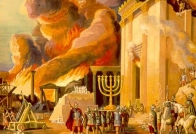
Jeremiah tried to save the people from punishment. He argued that none of the people were wise enough to understand God's teachings and therefore none of them would learn from God's punishment, either (Jer. 9:12). God rejected his intercession on their behalf, however, since the people willingly forsook the Torah and chose to disregard its commandments (Jer. 9:13). They had stubbornly hardened their hearts to follow after their own lusts. Therefore God would feed them with "wormwood" and give them "the water of gall" (ū×ųĄūÖųŠū©ūÉū®ūü) to drink (Jer. 9:15). Since the people willingly broke the covenant terms given at Sinai (Jer. 11), the LORD would scatter them among the nations, just as He promised He would to Moses (Jer. 9:16; cp. Lev. 26:33; Deut. 4:27; 28:64).
After being rejected time and again, the LORD instructed Jeremiah to call for the "professional wailers" to raise a lament for Zion. "How we are ruined! We are utterly shamed, because we left the land, because they have cast down our dwellings" (Jer. 9:17-19). God then explained to them that the hour of judgment has come (Jer. 9:20-22).
The Haftarah ends with a reminder that God's Torah called for faithful love, justice, and righteousness (ūŚųČūĪųČūō ū×ų┤ū®ūüų░ūżų╝ųĖūś ūĢų╝ū”ų░ūōųĖū¦ųĖūö), but Israel rejected God's way of life. "Thus says the LORD: 'Let not the wise man boast in his wisdom, let not the mighty man boast in his might, let not the rich man boast in his riches but let him who boasts boast in this, that he understands and knows me, that I am the LORD who practices loyal love, justice, and righteousness in the earth. For in these things I delight,' declares the LORD" (Jer. 9:23-24). According to Rambam and other commentators, this verse indicates that of all the various human achievements (represented by intellectuals, warriors, and merchants), the knowledge of God's love (chesed), justice (mishpat), and righteousness (tzedakah) is the best and most important.
According to midrash, Jeremiah was commanded by the LORD to return home to Anatoth because his merit was so great that God could not destroy Jerusalem as long as he was in the city (Pesikta d'Rav Kahana). Once he left, however, Jerusalem was conquered and and city was set on fire. When Jeremiah returned, he saw smoke rising from the Temple and rejoiced, thinking that the people had repented and were offering sacrifices. He wept bitterly when he realized he was mistaken...
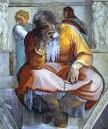
As a result of Judah's continued and unrepentant idolatry, Jerusalem was destroyed and the horrific visions of Jeremiah were fulfilled before his eyes... "The LORD has done what he planned; he has fulfilled his word, which he decreed long ago. He has overthrown you without pity, he has let the enemy gloat over you, he has exalted the horn of your foes" (Lam. 2:17). In the Book of Lamentations (i.e., Eichah: ūÉųĄūÖūøųĖūö), Jerusalem is personified as a woman who "weeps" for the destruction to come. She became like a widow who was left comfortless (Lam. 1:1-2). She saw babies and sucklings languish in the squares of the city (Lam. 2:10-11). All joy and hope were now lost as the people became enslaved to their captors (Lam. 5:1-4; 15-16).
Thankfully, the Book of Lamentations is not devoid of hope. Even after all the horrors that befell the people of Judah, God still encouraged them to seek Him again. "Because of the LORD's great love we are not consumed, for his compassions never fail. They are new every morning; great is your faithfulness" (Lam. 3:22-23). "The LORD is good to those waiting for him, to those who are seeking him out" (Lam. 3:25). "Let us search and examine our ways, And turn back to the LORD; Let us lift up our hearts with our hands To God in heaven: We have transgressed and rebelled, but You have not yet forgiven" (Lam. 3:40-42). The book ends with the great Hashivenu appeal to the LORD. When the reader reaches the word "Hashivenu" (the first word of the penultimate verse of the book), he pauses and the congregation recites the verse in unison: Hashivenu Adonai, elecha vena-shuvah; chadesh yamenu kekedem: "Turn us back to You, O LORD, and we shall be turned; renew our days as of old" (Lam. 5:21). Often this verse is repeated and sung to a haunting melody as the scroll is returned to the Ark.
Tishah B'Av and Yeshua's Return
When Yeshua read the Haftarah in the synagague and announced that the Messianic expectation was being fulfilled, He read only part of the passage from Isaiah 61:1-3 and then "closed the book," leaving verse "unfinished" (Luke 4:18-21). In other words, Yeshua read the following:
"The Spirit of the Lord GOD is upon me, because the LORD has anointed me to bring good news to the poor; he has sent me to bind up the brokenhearted, to proclaim liberty to the captives, and the opening of the prison to those who are bound; to proclaim the year of the LORD's favor..."
but He did not go on to finish the passage:
"...and the day of vengeance of our God; to comfort all who mourn; to grant to those who mourn in Zion - to give them a beautiful headdress instead of ashes, the oil of gladness instead of mourning, the garment of praise instead of a faint spirit; that they may be called oaks of righteousness, the planting of the LORD, that he may be glorified."
Yeshua will finish "reading" this verse when He returns at the end of the age (Yom Adonai, at the end of the Great Tribulation) to establish Zion as praise of the earth. At that time, the all the fast days surrounding the destruction of the Temple will be transformed into to appointed times of great joy (Zech. 8:19).
The word "Zion" is mentioned over 160 times in the Scriptures. That's more than the words faith, hope, love, and countless others... And since Zion is a poetic form of the word Jerusalem, the number of occurrences swells to nearly 1,000! It is therefore not an overstatement to say that God Himself is a Zionist.... "Out of Zion, the perfection of beauty, God shines forth" (Psalm 50:2). Zion represents the rule and reign of God in the earth and is therefore synonymous with the Kingdom of God. The entire redemptive plan of God -- including the coming of the Messiah Himself and our very salvation -- is wrapped up in the concept of Zion. It is the "historiography" of God -- His philosophy of history, if you will. And this perhaps explains why the world system (and its agency, the devil) routinely mischaracterizes and condemns "Zionism" as a form of racism or injustice...
God loves Zion since it symbolizes His redemptive program in human history. In a sense, Zion is the heart of the Gospel message and the focal point of God's salvation in this world. Zion represents our eschatological future -- our home in olam haba (the world to come). Even the new heavens and earth will be called Jerusalem -- "Zion in her perfection" (Rev. 21). "This is what Adonai Tzeva'ot says: I am very jealous for Jerusalem and Zion, but I am very angry with the nations that feel secure" (Zech. 1:14-15). "For Zion's sake I will not keep silent, for Jerusalem's sake I will not remain quiet, till her righteousness shines out like the dawn, her salvation like a blazing torch" (Isa 62:1). "The builder of Jerusalem is God, the outcasts of Israel he will gather in... Praise God, O Jerusalem, laud your God, O Zion" (Psalm 147:2-12).
Friends, how can we forget Zion, "the city of the living God, the heavenly Jerusalem" (Heb. 12:22)? Is she not "our mother" (Gal. 4:26)? Are we not her citizens, indeed, her exiles in this age? As the psalmist said, "If I forget you, O Jerusalem, let my right hand forget its skill! Let my tongue stick to the roof of my mouth, if I do not remember you, if I do not set Jerusalem above my highest joy!" (Psalm 137:5-6). Of course we are instructed to "pray for the peace of Jerusalem" (Psalm 126:6), but we are further told to "badger" the LORD until he makes Zion "the praise of the earth" (Isa. 62:7).
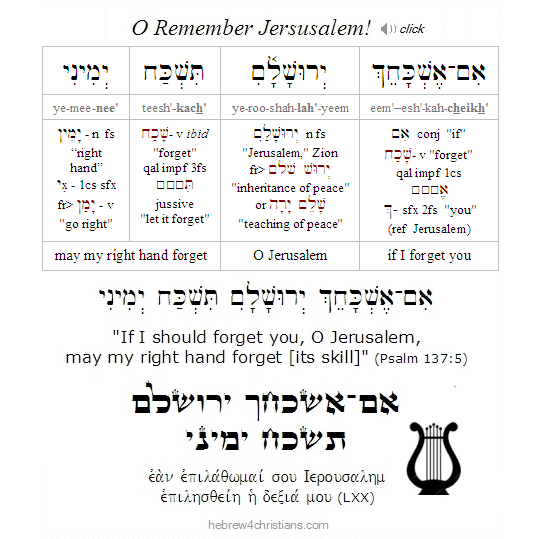 |
Israel still has prophetic destiny that awaits fulfillment. One day all Israel will be saved and comforted by God. Yeshua will return as Israel's Messiah and all the words given to the Hebrew prophets will literally be fulfilled. Zion will indeed become the praise of the earth!
Addendum: It is clear that we are living in a time that is not unlike that of ancient Judah before God's hammer of judgment fell. Like ancient Judah, we have little time left for us to repent before complete destruction of our nation occurs before our very eyes. Time is very short, chaverim. Though we may expect the rapture, this does not guarantee that our nation will not undergo judgment from heaven and we will face serious tribulation in the days to come... In light of the progressive judgments from heaven that continue to befall the United States, it is imperative for us to carefully heed the message and warning of Tishah B'Av. Please pray for genuine and heartfelt teshuvah (repentance) to come to this land, chaverim, before it's too late...
|

